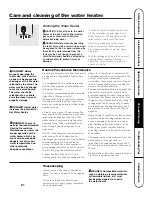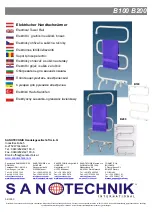
Installing the water heater.
This water heater must be installed in accordance with these instructions, local codes, utility company
requirements, and/or in the absence of local codes, use the latest edition of the American National
Standard/National Fuel Gas Code. A copy can be purchased from either the American Gas Association, 1515
Wilson Blvd., Arlington, VA 22209 as booklet Z223.1 or National Fire Protection Association, Batterymarch
Park, Quincy, MA 02269 as booklet NFPA No. 54.
Location
The water heater should not be located in
an area where leakage of the tank or
connections will result in damage to the
area adjacent to it or to lower floors of
the structure.
When such areas cannot be avoided it is
recommended that a suitable catch pan,
adequately drained, must be installed
under the water heater.
The pan must not restrict combustion air
flow to the bottom of the water heater.
Catch pan kits are available from the store
where the water heater was purchased, or
any water heater distributor.
A gas fired water heater should not be
installed in a space where liquids which
give off flammable vapors are to be used
or stored. Such liquids include gasoline, LP
gas (butane and propane), paint or
adhesives and their thinners, solvents
or removers.
Because of natural air movement in a
room or other enclosed space, flammable
vapors can be carried some distance from
where their liquids are being used or
stored. The open flame of the water
heater’s pilot light or main burner can
ignite these vapors causing an explosion
or fire which may result in severe burns,
death or property damage.
For these reasons installation of a gas fired
water heater in a garage is not desirable.
Raising the gas fired water heater will
reduce, but not eliminate, the possibility
of lighting the vapor of any flammable
liquids which may be improperly stored or
accidentally spilled.
Stand kits to raise the water heater 18
″
above the floor are available from the store
where the water heater was purchased, or
any water heater distributor. These kits
must comply with local codes.
The water heater must be located so it is
not subject to physical damage, for example,
by moving vehicles, area flooding, etc.
●
The water heater should be installed as
close as practical to the gas vent or
chimney.
●
Long hot water lines should be insulated
to conserve water and energy.
●
The water heater and water lines
should be protected from exposure
to freezing temperatures.
●
Do not
install the water heater in
bathrooms, bedrooms, any occupied
rooms normally kept closed, or in
outdoor unprotected areas.
●
Minimum clearance from combustible
construction is 1
″
sides and rear; 3
″
from front of control; 12
″
from the top.
If the clearances stated on the
Instruction/Warning Label, located on
the front of the heater differ, install
the water heater according to the
clearances stated on the label.
●
The water heater may be installed on
combustible floors, but not directly on
carpeting. If the water heater must be
installed on carpeting, place a metal or
wood panel beneath the water heater,
extending beyond its full width and
depth at least 3
″
in all directions.
●
If the water heater is installed in an
alcove or closet, the entire floor must
be covered by a wood or metal panel. A
minimum of 24
″
clearance from the
front and top should be available for
adequate inspection and servicing.
●
If flexible connectors are used, the
maximum length shall not exceed 36”.
●
If lever type gas shut-offs are used,
they shall be T-Handle type.
The auxiliary catch pan
installation MUST conform
to local codes.
Max.
2
″
Diameter of
water heater
plus 2
″
min.
7
Safety Instructions
Installation Instructions
Operating Instructions
Care and Cleaning
T
roubleshooting Tips
Customer Service
WARNING: If a location in
a garage is the only
alternative, the gas water
heater should be installed
so that the open flame of
the pilot and main burner
are no less than 18
″
above
the garage floor, unless
specifically exempted from
this by local code, rule,
regulation or custom.
WARNING: Combustible
construction refers to
adjacent walls and ceilings
and should not be confused
with combustible or
flammable products and
materials. Combustible
and/or flammable products
and materials should never
be stored in the vicinity of
this or any gas appliance.








































